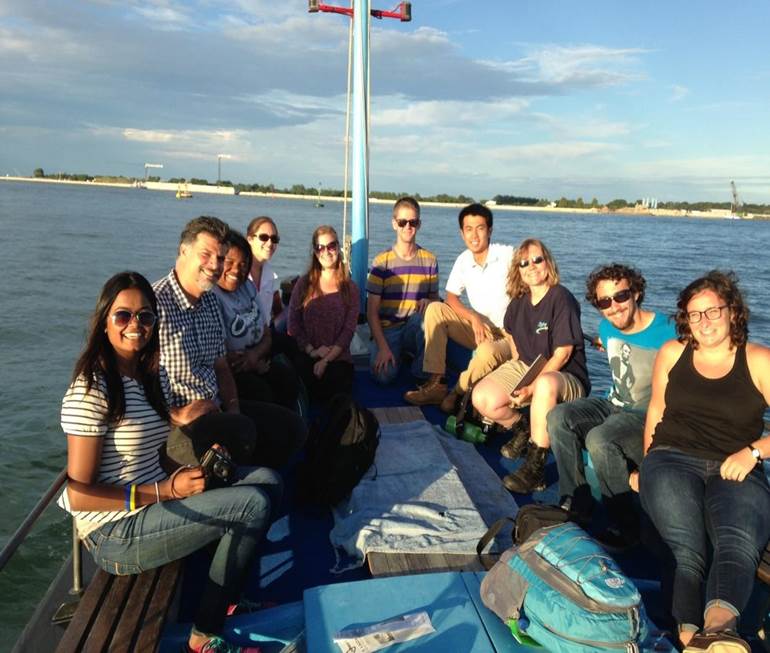 Civil, Architectural, and Environmental Engineering (CAEE) Department Associate Professor Dr. Franco Montalto P.E. and a group of students from this summer’s Sustainable Water Resource Engineering (CIVE 564) class spent two and a half weeks in the beginning of September, on the island of Lazzaretto Nuovo in Venice, Italy. With support from the CAEE Department, the College of Engineering, Pennoni Honors College, The Office of International Programs, and the Study Abroad office, eight students from this class traveled to Italy to execute an in-depth investigation of the treatment efficiency of a constructed wetland that receives domestic wastewater from a forty person camp located on the island. Dr. Montalto designed this system eighteen years ago as a Fulbright scholar, and this trip was his first opportunity to mobilize a group of students to monitor its performance. Students in attendance were Adam Bleiman, Ajin Fatima, Linette Figueroa, Hunter Gayden, Belinda Lester, Lisa Peterson, Ge Pu, Sarah Wadsworth, and class Teaching Assistant Kaitie Sniffen.
Civil, Architectural, and Environmental Engineering (CAEE) Department Associate Professor Dr. Franco Montalto P.E. and a group of students from this summer’s Sustainable Water Resource Engineering (CIVE 564) class spent two and a half weeks in the beginning of September, on the island of Lazzaretto Nuovo in Venice, Italy. With support from the CAEE Department, the College of Engineering, Pennoni Honors College, The Office of International Programs, and the Study Abroad office, eight students from this class traveled to Italy to execute an in-depth investigation of the treatment efficiency of a constructed wetland that receives domestic wastewater from a forty person camp located on the island. Dr. Montalto designed this system eighteen years ago as a Fulbright scholar, and this trip was his first opportunity to mobilize a group of students to monitor its performance. Students in attendance were Adam Bleiman, Ajin Fatima, Linette Figueroa, Hunter Gayden, Belinda Lester, Lisa Peterson, Ge Pu, Sarah Wadsworth, and class Teaching Assistant Kaitie Sniffen.
For two and a half weeks, the Drexel team lived and worked on the island, extracting water samples from septic tanks, from the wetland’s beds and finishing pond, and from the lagoon itself. Two students were assigned to each of the four sampling locations and remained assigned to the same location for the entire trip, in order to minimize errors and therefore keep the sampling consistent. Analytical work was performed at a state of the art laboratory operated by Consorzio Nazionale di Ricerca (CNR), a national lab located inside Venice’s historical Arsenal building, originally built during the Middle Ages. BOD5, microbial, and nutrient testing were performed on these samples. Through their work, the students demonstrated that without any chemical or energy inputs, this natural treatment system was able to remove more than 95% of the BOD, ammonia, phosphate, and Enterrococcus spp indicator bacteria it received during the eight day monitoring period. Only nitrates had a lower removal efficiency (e.g. 40%). The students presented their results to a group of Venetian scientists, researchers, professors, and community organizations, and are working on a manuscript to submit to a journal for publication of the findings.
In addition to the work in Venice, the students visited eight other sustainable water management projects in New York, New Jersey, Pennsylvania and in Italy, in the delta of the Po River. “We live in a time of great changes in how natural resources, urban communities, and ecosystems are perceived and managed. By visiting these innovative case studies, my hope was that students would come out of my class feeling optimistic about their ability, as engineers and designers, to make progress on the greatest challenges facing our global community in the first half of the 21st century,” says Montalto.
Environmental Engineering doctoral student Lisa Peterson notes, “As the oldest student in the class, with my corporate career in wastewater, drinking water, and desalination system design nearly behind me, I have a unique perspective on this experience. This opportunity to do water quality testing on a wetland was professionally interesting as a comparison to traditional municipal treatment operations. This experience was a wonderfully relevant one for students who are about to begin their careers, for it provides them with an opportunity to speak with potential employers about their proficiencies with fieldwork, teamwork, troubleshooting, diagnosing, and client relations. In addition to Drexel’s co-op, experiences like this are extremely beneficial to prepare students for successful careers in engineering.”
Civil Engineering undergraduate student Belinda Lester also commented, “I had a great experience during this trip, both educationally and culturally. Our trip to Italy provided us with on-site knowledge of practices being implemented in Venice with discussion on how these practices can be transferable to other locations. This class has expanded my view on the complexities of water resource management. Engineering students like us have the power and responsibility to bring new perspectives to the field and to execute practices in ways that coexist with the natural environment while still efficiently addressing basic human needs.”